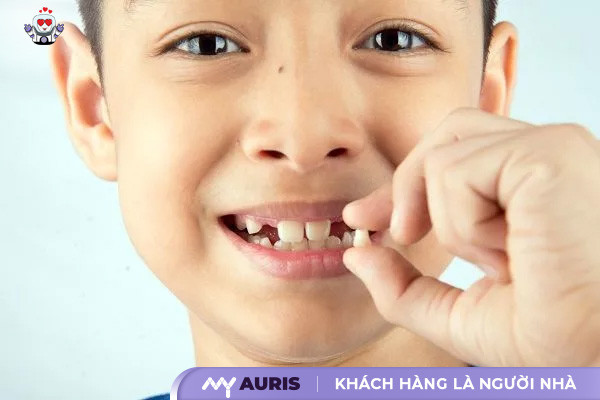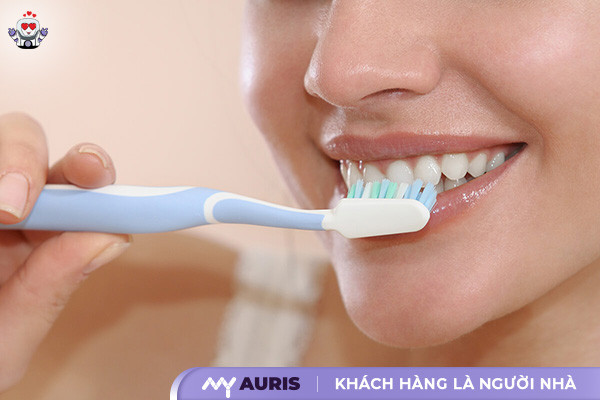Ceramic crowns are currently one of the popular cosmetic dentistry methods, helping to effectively overcome the condition of dull, chipped, broken or yellow teeth. This is a quick solution for bright, white, beautiful teeth, but does it affect health, especially for children under 18 years old? So should you get porcelain crowns? To make the right decision, join My Auris to learn in detail about the benefits, risks and things to keep in mind when getting porcelain crowns in the article below!
13,14,15,16 years old can get porcelain crowns no?
Dentists often recommend not getting porcelain crowns for adolescents aged 13, 14, 15, 16 or 17. The reason is because during this period, teeth and jawbone have not yet developed stably. Some children have replaced baby teeth with permanent teeth, but there are still cases where permanent teeth have not yet completely erupted. Porcelain crowns during this period can affect oral health and tooth development.
However, this problem is not absolute. In some cases, minors aged 13-17 years old can receive porcelain crowns if the dentist determines that the teeth and gums are eligible. This is often considered in the following cases:
The permanent tooth is severely decayed, cracked or has pulpitis that cannot be restored by other methods.
In this case, porcelain crowns will help protect real teeth and prevent infection. becomes serious.
Porcelain crowns for minors should only be performed with a thorough assessment from a specialized dentist.
Teeth needing porcelain crowns must meet the conditions for porcelain crowns, including having completely fallen out baby teeth. complete and stable permanent tooth formation.

The ideal age for porcelain crowns
Age for porcelain crowns is an important factor that determines the safety and effectiveness of the treatment process. According to dental experts, each person has a different rate of tooth development. The basic conditions for porcelain crowns are fully grown permanent teeth.
Dentists recommend that the ideal age for porcelain teeth is 18 years or older. At that time, the permanent teeth are complete, the jawbone develops stably, helping to avoid complications of porcelain crowns and ensuring optimal results.
In some special cases, children with porcelain crowns can be considered if they have serious tooth decay, affecting other teeth. The dentist will carefully evaluate the condition of teeth, oral health and age before recommending an appropriate dental treatment plan.
No matter the age of porcelain crowns, regular dental check-ups (at least every 6 months) are essential. This helps monitor tooth condition, prevent problems from arising and replace porcelain teeth when needed.
Should you have porcelain crowns?
Are porcelain crowns for children, especially under 16 years old, really necessary? According to experts, this decision depends on the child’s specific dental condition. The important factor to consider is whether the child has lost all of his baby teeth and whether the permanent teeth have fully developed. Doctors recommend not getting porcelain crowns too early, but the ideal time is after 18 years old, when the jawbone and teeth are complete.
Young children have thin tooth enamel, unstable teeth, and are susceptible to sensitivity and pain if porcelain crowns. Doing it too early can lead to gingivitis, pulp damage and reduce the lifespan of the tooth. In addition, children do not have a good sense of dental care, easily causing their teeth to become dull and chipped.
However, in some cases such as severely decayed teeth that cannot be filled, or teeth that are chipped or broken due to an accident, the doctor may consider porcelain crowns to protect neighboring teeth from the risk of spreading damage. Choosing the appropriate method will be advised by the doctor based on the child’s specific dental condition.

Should adults get porcelain crowns?
Porcelain dental crowns are a popular dental cosmetic method that helps correct defects on teeth. If performed by a highly skilled doctor, using modern medical equipment and ensuring the correct rate of tooth pulp grinding, this method does not affect real tooth tissue.
Benefits of porcelain crowns:
Ceramic teeth have the same shape, size and color as real teeth, with smile confidently again. The color-resistant coating prevents teeth from being contaminated with foods that cause discoloration.
Ceramic teeth have high hardness, even superior to real teeth. For example, metal-ceramic teeth reach a hardness of 360MPa, while all-ceramic teeth can reach up to 900MPa.
If done with proper technique, porcelain crowns do not cause long-term sensitivity. There is only discomfort for the first 1-2 days.
Metal ceramic teeth have a lifespan of 7-10 years, while all-ceramic teeth can last 15-20 years.
Only takes 2-3 days to complete. Complete the process of porcelain crowns.
Ceramic crowns make oral hygiene easier, limiting plaque and bacteria from accumulating between teeth.
Ceramic crowns act as a shield to protect teeth from external forces and bacteria. bacteria.
When should porcelain crowns be performed on children?
Ceramic crowns for adolescents, especially at age 14, should be considered carefully because the jawbone is still developing and the teeth are not yet complete. According to dentists, if there are no compelling situations, children at this age should not have porcelain teeth. However, in some special cases, treatment may be necessary.
When tooth decay in children is severe, conventional filling methods may no longer be effective. If not treated promptly, tooth decay has the risk of spreading to neighboring teeth, affecting permanent teeth. In this situation, the dentist will thoroughly evaluate and recommend a suitable porcelain crown treatment regimen.
Accidents or dental trauma in children can cause serious tooth fractures that cannot be restored with fillings. To protect real teeth and maintain chewing function, the doctor will consider porcelain crowns with suitable materials to ensure durability and safety.

Cases where porcelain teeth should not be covered in 18 year olds
Are permanent teeth intact? fully developed
At age 18, some adolescents’ permanent teeth have not yet fully developed. Porcelain crowns for children in stagesThis can put pressure on neighboring teeth, distort the bite and negatively affect chewing function. Therefore, if the teeth are not stable, parents need to consider before letting their children have porcelain crowns.
Children with systemic diseases
Children with systemic diseases such as cardiovascular disease, Hemophilia, etc. are usually not recommended for porcelain crowns. The reason is because this process requires the use of anesthesia, which can cause side effects and affect health. In this case, parents should consult a dentist before deciding.
Severe malocclusion
For children with severe malocclusion, Orthodontic braces are a better solution than porcelain crowns. Adjusting teeth to the correct position helps improve bite and ensure chewing function. After completing braces, if the teeth show signs of dullness or yellowing and the child is eligible, porcelain crowns can be an effective solution to improve tooth aesthetics.
Sensitive teeth
Tooth crowns Porcelain requires grinding down the tooth pulp, a process that can cause pain and damage the pulp if the tooth is too sensitive. When the tooth pulp is affected, children may experience prolonged sensitivity, weakening the teeth and reducing the ability to chew. Therefore, in cases where teeth are too sensitive, careful consideration is needed before performing porcelain crowns.
The tooth is broken into a large piece, only the root remains
If the tooth is severely damaged, with only a small portion of the root remaining, the porcelain crown will not be able to fix it firmly. In this case, the dentist may prescribe tooth root removal and the use of a spacer to prevent other teeth from growing crookedly. When children turn 18 years old, dental implants are the optimal solution to restore chewing function and prevent bone loss.

How to take care of children’s teeth to avoid porcelain crowns early
Children’s porcelain crowns, especially porcelain crowns under 18 years old, need to be considered carefully. To limit the need for early porcelain crowns, parents should guide children in proper dental care from an early age. Below are effective solutions to help children have good oral health and avoid dental diseases:
Brush all tooth surfaces: outer, inner and outer surfaces.Chew.
Brush your teeth twice a day, for at least 2 minutes each time.
Use a soft-bristled toothbrush and toothpaste containing fluoride to protect tooth enamel.
Limit sweets such as candy, cakes, carbonated soft drinks – the main cause of tooth decay.
Add foods good for teeth such as milk, cheese, green vegetables, nuts to help increase calcium and protect teeth.
Encourage children to drink water after eating to remove bacteria and plaque from their teeth.
Have children wear a mouthguard when sleeping to limit the effects of teeth grinding.
Equip protective gear when playing sports to reduce the risk of tooth damage.
Take your child to the pediatric dentist for check-ups every 6 months to detect abnormalities early.
Timely When dealing with cavities or misaligned teeth to avoid affecting future oral development.
Before deciding, children need to be thoroughly examined by a specialist to ensure safety and effectiveness. Children’s braces or other restoration methods will be more suitable than porcelain crowns for children under 18 years old. Therefore, to best protect your child’s teeth, guide your child to take scientific dental care today!





